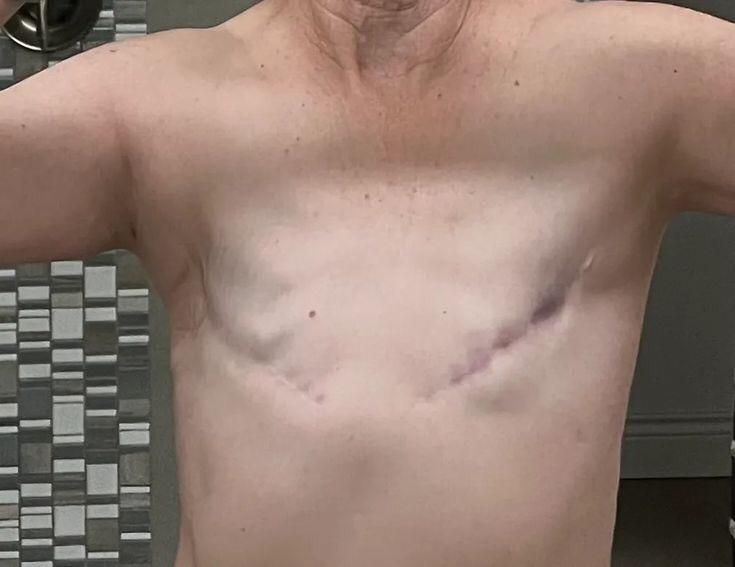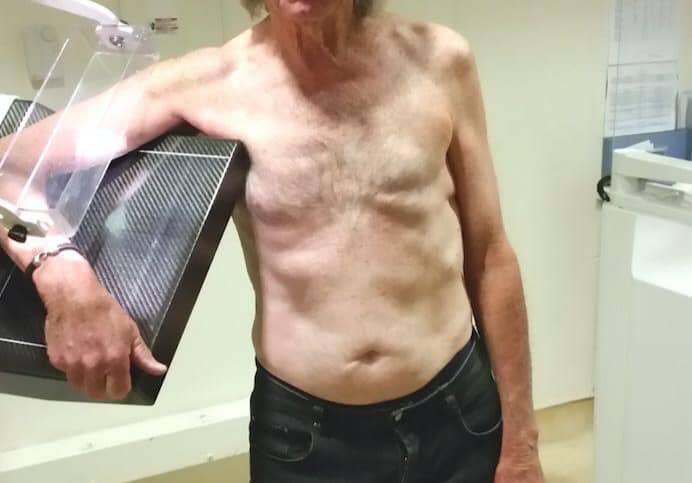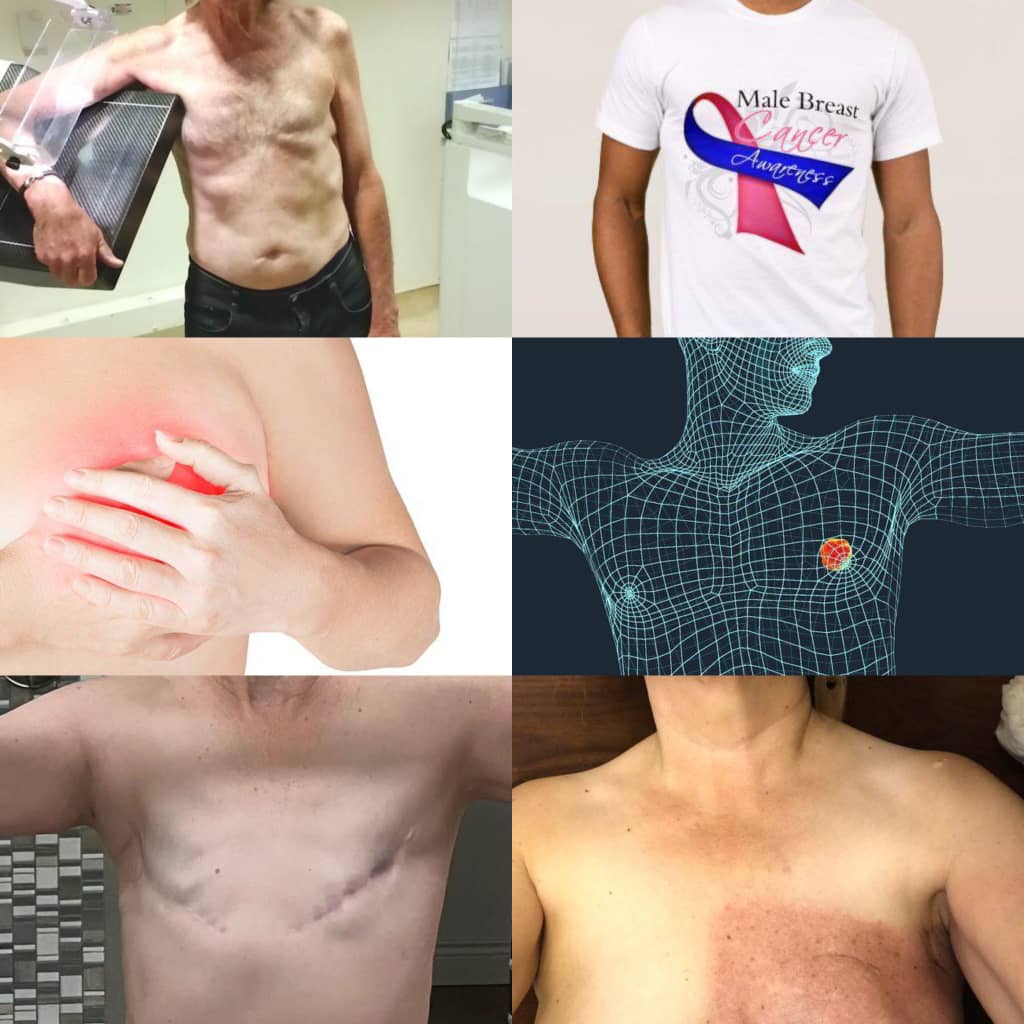By Ruth Adebayo and Oluwatobi Aroyehun
For years, many people around the world perceived breast cancer as a women’s health issue. However, the reality is that men can also develop breast cancer.
According to the World Health Organization (WHO), about 1% of all breast cancer cases occur in men. While the incidence is lower than it is in women, the consequences can be just as devastating.

Doctor Ezekiel Adeshina Oladepo, A Senior Registrar in General Surgery at the University of Ilorin Teaching Hospital (UITH) told theheraldnews.ng in an exclusive interview that breast cancer is an abnormal growth in the breast.
He noted that while it is relatively rare in men, the risk is still significant: “In every 10,000 men, one is at risk of developing breast cancer,” he explained.
Drawing from his practical experience as a medical doctor, Oladepo informed that he had encountered at least four cases of breast cancer in men throughout his career. He emphasized the importance of awareness and early detection.

On the challenges of addressing male breast cancer in Nigeria, Oladepo said: “In our part of the country, there’s a prevalent mentality that breast cancer is a spiritual issue or something of no greater risk. This misconception often leads to delayed presentation at the hospital, making the case worse before medical attention is sought.”
Symptoms
He further elaborated on the symptoms of male breast cancer, emphasizing that they are similar to those experienced by women.
“The symptoms of breast cancer in men are synonymous with those in women, these include:
•Swollen breasts
•Skin changes, such as dimpling, puckering, or redness
•Swelling or thickening of the breast tissue
•Peau-de-orange (a condition that causes the skin to resemble the texture of an orange)
•Nipple discharge or bleeding
•Pain or tenderness in the breast or nipple
•Changes in the nipple, such as inversion or retraction
•A lump or thickening in the breast or underarm area
•Redness or scaliness of the nipple or breast skin
•Changes in the size or shape of the breast
“Early detection is key to surviving breast cancer. Men need to be aware of their breast health and seek medical attention immediately if they notice any unusual changes.”

Precautions
He further explained that while there is no standardized screening program for male breast cancer, men can take proactive steps to detect the disease early. “Men can perform self-exams to check for any lumps, thickening, or changes in the breast tissue and underarm area.
“Additionally, men with a family history of breast cancer or other risk factors should consult their doctor about their individual risk and screening options.”
Oladepo explained that the treatment for male breast cancer is similar to that for female breast cancer, adding that “The primary goal of treatment is to remove the cancer and prevent it from spreading.”
Treatment
He, however, outlined the following treatment options for male breast cancer:
•Surgery: Surgery is often the first line of treatment for male breast cancer. The type of surgery used depends on the stage and location of the cancer. Options include mastectomy (removal of the breast), lumpectomy (removal of the tumor and surrounding tissue), and axillary lymph node dissection (removal of lymph nodes in the armpit).
•Chemotherapy: Chemotherapy uses medications to kill cancer cells. It may be used before or after surgery to treat male breast cancer.
•Radiation therapy: Radiation therapy uses high-energy rays to kill cancer cells. It may be used after surgery to treat male breast cancer.
•Hormone therapy: Hormone therapy uses medications to block the production of hormones that fuel the growth of cancer cells. It may be used to treat male breast cancer that is hormone receptor-positive.
•Palliative care: Palliative care focuses on relieving the symptoms, pain, and stress of cancer, rather than treating the cancer itself. It may be used in conjunction with other treatments to improve the quality of life for men with advanced male breast cancer.

He explained that the choice of treatment depends on the individual case and the stage of the cancer. “It’s essential for men to work closely with their healthcare team to determine the best course of treatment for their specific situation,” he advised.
He concluded by stressing the vital role of early detection and awareness in cancer care. “Early detection is the key to surviving breast cancer. Men should not view breast cancer as a death sentence, but rather seek medical attention immediately if they notice any unusual changes.”
He also highlighted the importance of sensitization, stating that “awareness cannot be overemphasized, as it will save countless lives and prevent unnecessary suffering.”
Pharmacist Modupe Lydia Olanrewaju, also from the oncology department, added her voice to the call for awareness and early detection. “I plead with men to be more aware of their breast health and to seek medical attention immediately if they notice any unusual changes,” she urged.
She also cautioned against letting supernatural beliefs cloud one’s judgment. “It’s essential to separate myth from reality and not attribute breast cancer to supernatural forces,” she emphasized.
Olanrewaju appealed to the general public to prioritize their health. “Don’t be afraid to seek medical help. Hospitals are there to support your health, not to harm you. By being proactive about your health, you can detect breast cancer early and improve your chances of survival.”

